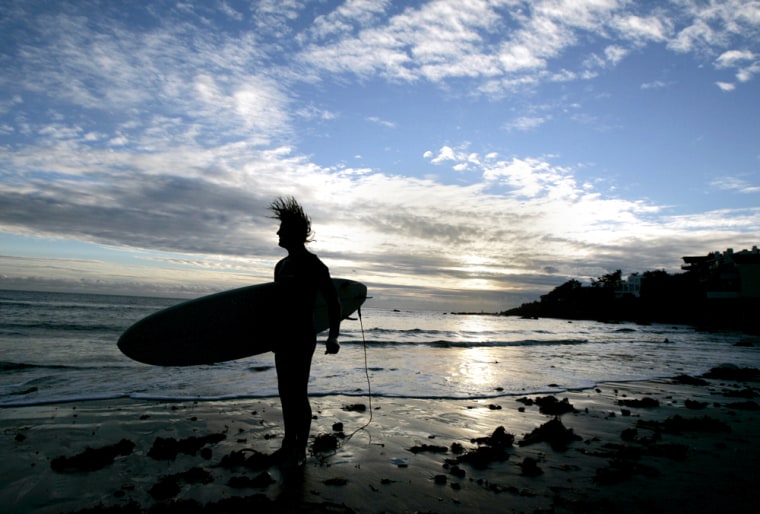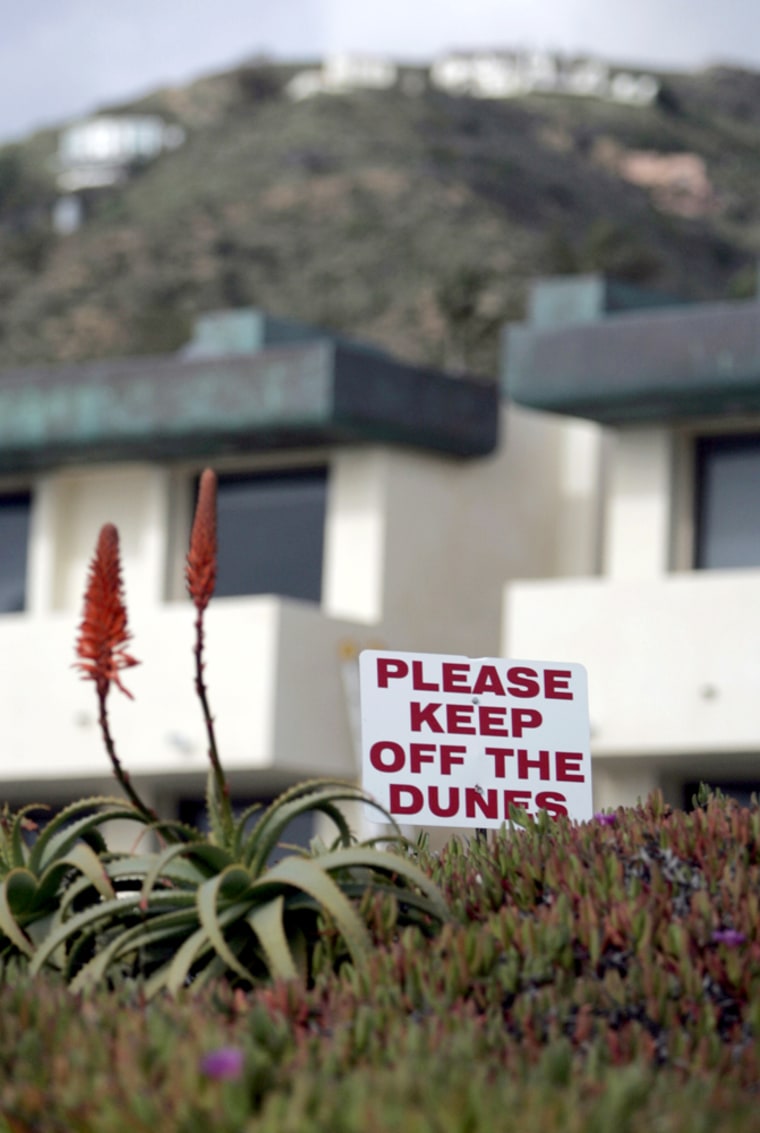Just off the Pacific Coast Highway, where the Santa Monica Mountains loom over the ocean, some of Hollywood’s biggest stars have settled into a slice of heaven.
Steven Spielberg. Danny DeVito. Goldie Hawn. Over the years, they have joined the lucky few who call Broad Beach home.
Their front yards open onto a mile-long, sandy stretch of California coastline. They spent millions to get here, and they’d like to be left alone.
Alan Latteri didn’t spend a dime, and nobody’s heard of him. But he figures he has as much right to the sand, surf and sun as any movie mogul.
The California Coastal Commission agrees. So do the residents of Broad Beach, as long as Latteri and others stay off their property.
The question is: Where does the front yard end and the public beach begin? So far, the answer is a crazy quilt of property lines, easements and No Trespassing signs that confuse all but the experts.
It takes a map, a tape measure and the soul of a surveyor just to figure out where to legally lay out a beach towel. A walk along the beach can require as many twists and turns as a Hollywood whodunit.
Staying in the wet sand is a safe bet for beach-goers. That’s public. Beyond that, a day at the beach could involve a bucket of trouble.
Two security guards patrol on ATVs in the summer, making sure visitors don’t stray into private areas. Some, like Latteri, claim they’ve been intimidated or harassed.
'It's about privilege'
Homeowners complain that people hang out in their beachfront yards, dump their trash and defecate on the beach. They accuse the Coastal Commission of in effect trying to seize chunks of their land.
The commission and others say the dispute is all about guaranteeing public access to a state-owned beach.
“The problem really isn’t about parking or restrooms or any of that,” said Steve Hoye, founder of California’s Access For All. “It’s all about private property and public, and it’s about privilege. People would like to think Broad Beach is private.”
The clash over shoreline access goes on across the country, leading to lawsuits and disagreements in North Carolina, Michigan, Ohio and elsewhere. Private development along the New Jersey shore makes it almost impossible for the public to reach the beach in some areas.
But the battle at Broad Beach has something most beaches don’t — star power. Add in politics, and pretty much everyone has an opinion about it.
“It’s the wealthy against the average guy,” said Jefferson Wagner, owner of the Zuma Jay surfshop in Malibu.
Celebrities have been living in Malibu, about 20 miles west of Los Angeles, since the 1920s, when Clara Bow, Bing Crosby and Joan Crawford helped turn the small community into an A-list hotspot. Today, many of Malibu’s famous residents spend their summer here in homes that range from $3 million to $30 million.
The celebrities aren’t eager to talk about the beach battle. But many Malibu residents support their Broad Beach neighbors and complain that the public doesn’t respect the beach.
“They treat this like a huge garbage dump,” said Ron Lawrence, a retired doctor out for a morning walk along Broad Beach. “I’ve seen people defecate on the beaches. They wouldn’t tolerate it in the city.”
Marshall and Winifred Lumsden aren’t famous, but they live among their tinsel-town neighbors in a cottage on Broad Beach, right next to one of two county-owned public pathways that lead from the road to the beach.
Families and surfers walk past their house to get to the sand, and some wash themselves with water out of the Lumsdens’ faucet.
Children want to play on the slide in their sandy front yard; dogs have run through their house. During the summer, people ask to use their restroom or plop down right in their sand.
“I’ll go out and ask them to move down a little bit,” said Marshall Lumsden, 82.

There are no public restrooms, no lifeguards, no restaurants on the beach. But that doesn’t discourage Latteri and others from wanting to soak up the million-dollar views for a few hours on the cheap.
“You gotta let us poor people have a little bit of fun,” said Latteri, a 29-year-old who is in between jobs and drives here from Los Angeles.
Broad Beach visitors complain that security guards harass them or imply that the beach is private.
“He tried to scare me off,” Latteri said of one guard.
The “private property, do not trespass” signs don’t help explain the boundaries, either. On this day, the signs put up by homeowners claim the private property line begins 22 feet toward the ocean from where the sign is placed.
Houses next door might have an unmarked easement that allows public access.
It’s so complicated that the Coastal Commission posted a map of Broad Beach easements on its Web site last year to help explain it. But who prints out a map before hitting the beach?
The Coastal Commission wants the signs and the guards removed.
“If they are really concerned about the public trespassing onto their property or breaking into their homes, they can do what most of us do. We lock our doors,” said Linda Locklin, access program manager for the commission.
“Most of us live in cities and most of us have a sidewalk in front of our houses, and the public goes on that sidewalk at all hours of the day,” she said. “The rest of us have all come up with mechanisms to cope.”
Homeowners have nothing against the public, said Marshall Grossman, an attorney and board member of Broad Beach’s homeowners association. They just have to protect themselves.
Most of the confusion surrounds the easements.

When beachfront homeowners want to develop their property, remodel or put up a sea wall, they apply for a permit from the Coastal Commission. The commission often requires owners to offer a public access easement across their property.
Fifty-two of the 108 properties on Broad Beach have lateral easements; many just went into effect last year. Easements vary in depth, but all begin where the wet sand meets the dry sand and extend back toward the homes. The public gets down to the beach from the county-owned pathways, then can move across the beach, in dry sand, along public easements.
But because not every house has an easement, the sand is a checkerboard of public and private patches. Wet sand is all public.
“As a result, members of the public and homeowners alike are hopelessly confused as to where the public can walk or park themselves and where they can’t,” Grossman said.
Hired muscleLast summer, Coastal Commissioner and Malibu resident Sara Wan went to Broad Beach and sat down on public sand with her ice chest and towel. But almost as soon as she did, she was approached by a security guard on an ATV who reminded her to stay in the public sand. When she started walking, sheriff’s deputies showed up, and she had to explain she really was on public land.
“The beach is basically a public asset. It shouldn’t be just for those people who bought homes there,” Wan said. “It should belong to everybody.”
Grossman, a former Coastal Commission member, accuses the commission of scheming to get lateral easements from homeowners by making the permit process cumbersome. He cites a 1987 U.S. Supreme Court ruling that found the commission’s practice of obtaining easements at the time to be an “out-and-out plan of extortion.”
The homeowners want lateral access to be uniform along the beach, but refuse to get rid of the security guards. Grossman said homeowners are willing to remove the signs and place smaller ones on each property.
If the two sides can’t agree, the commission could pursue a cease-and-desist order against homeowners or the whole mess could end up in court.
On Memorial Day weekend, Hoye and his Access for All group plan a beach brigade, passing out maps to the public, showing people exactly where they can sit on public land and encouraging them to do so.
“What will it take for these homeowners to chill on this operation?” he said. “Stop harassing people. If they want to go to war, we’re prepared to.”
Until summer comes, Broad Beach hardly seems set for war, even of the Hollywood variety. As waves rustled ashore and the sea air beckoned one recent morning, lawn chairs sat perfectly placed on the porches of sprawling celebrity homes. Dogs splashed in the water, and joggers pounded past the surf, ignoring the invisible lines in the sand.